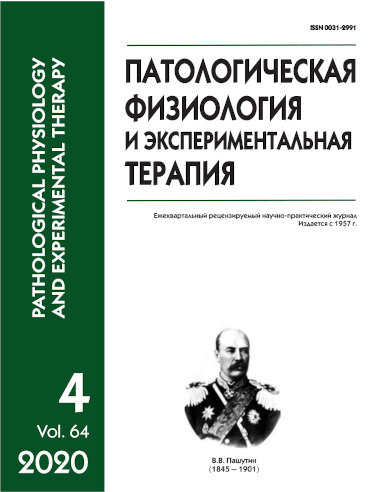Ремоделирование неоинтимы при каротидном атеросклерозе: влияние матриксных металлопротеиназ-2 и -9 и сосудистых гладкомышечных клеток различного фенотипа
DOI:
https://doi.org/10.25557/0031-2991.2020.04.20-30Ключевые слова:
каротидный атеросклероз, сосудистое ремоделирование, гладкомышечные клетки, матриксные металлопротеиназы, ММП-2, ММП-9, CD68, RUNX2Аннотация
Цель исследования – изучение распространенности и локализации сосудистых гладкомышечных клеток (СГМК) различного фенотипа в составе атеросклеротических бляшек сонной артерии, а также взаимосвязи различных клеточных популяций неоинтимы с экспрессией матриксных металлопротеиназ (ММП)-2 и ММП-9 в зависимости от степени стабильности бляшки.Методы. Проведено иммуногистохимическое исследование 16 атеросклеротических бляшек (8 клинически нестабильных и 8 стабильных), полученных при каротидной эндартерэктом в связи с гемодинамически значимым стенозом. Оценка сократительной способности СГМК проводилась при использовании метода иммуногистохимического типирования альфа-актина гладких мышц (α-SMA), синтетического, макрофагального и остеогенного фенотипов СГМК посредством типирования виметина, СВ68 и RUNX2 соответственно. Активность ремоделирования определялась посредством выявления ММП-2 и ММП-9.Результаты. Показано, что около трети каротидных бляшек характеризовались высокой экспрессией MMП-9 CD68-положительными клетками, что не коррелировало с их нестабильностью. Локализация, содержание и соотношение СГМК различного фенотипа и макрофагов значительно варьировали в зависимости от бляшки. Общей закономерностью было преимущественное послойное типирование на α-SMA в зоне интактных эластических волокон медии и, реже, в фиброзной покрышке или прилегающих участках. CD68-положительные клетки визуализировались в толще неоинтимы; некоторая их доля была колокализована с α-SMA, отражая СГМК макрофагального фенотипа. Положительное реакция на виментин наблюдалась на границе с эластическими волокнами медии, либо с основной клеточной массой неоинтимы и характеризовалась прилегающим бесклеточным экстрацеллюлярным матриксом, что свидетельствовало об активном синтезе его соответствующими клетками. Также в неоинтиме обнаруживались клетки положительные как на RUNX2 и α-SMA, так и исключительно RUNX2-положительные клетки.Заключение. Каротидные атеросклеротические бляшки характеризуются различной локализацией, содержанием и соотношением СГМК сократительного, синтетического, макрофагального и остеогенного фенотипов, при этом экспрессия ММП-2 и ММП-9 была ограничена CD68-положительными макрофагами и СГМК макрофагального фенотипа.Загрузки
Опубликован
2020-11-26
Выпуск
Раздел
Оригинальные исследования
Как цитировать
[1]
2020. Ремоделирование неоинтимы при каротидном атеросклерозе: влияние матриксных металлопротеиназ-2 и -9 и сосудистых гладкомышечных клеток различного фенотипа. Патологическая физиология и экспериментальная терапия. 64, 4 (Nov. 2020), 20–30. DOI:https://doi.org/10.25557/0031-2991.2020.04.20-30.













